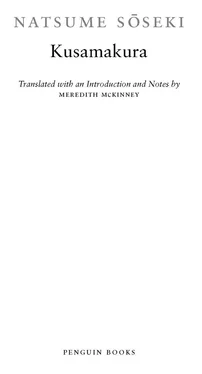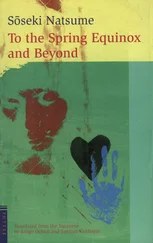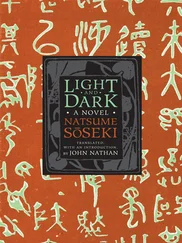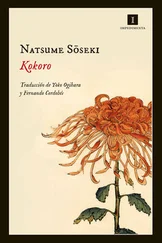Natsume Soseki - Kusamakura
Здесь есть возможность читать онлайн «Natsume Soseki - Kusamakura» весь текст электронной книги совершенно бесплатно (целиком полную версию без сокращений). В некоторых случаях можно слушать аудио, скачать через торрент в формате fb2 и присутствует краткое содержание. Жанр: Старинная литература, на английском языке. Описание произведения, (предисловие) а так же отзывы посетителей доступны на портале библиотеки ЛибКат.
- Название:Kusamakura
- Автор:
- Жанр:
- Год:неизвестен
- ISBN:нет данных
- Рейтинг книги:4 / 5. Голосов: 1
-
Избранное:Добавить в избранное
- Отзывы:
-
Ваша оценка:
- 80
- 1
- 2
- 3
- 4
- 5
Kusamakura: краткое содержание, описание и аннотация
Предлагаем к чтению аннотацию, описание, краткое содержание или предисловие (зависит от того, что написал сам автор книги «Kusamakura»). Если вы не нашли необходимую информацию о книге — напишите в комментариях, мы постараемся отыскать её.
Kusamakura — читать онлайн бесплатно полную книгу (весь текст) целиком
Ниже представлен текст книги, разбитый по страницам. Система сохранения места последней прочитанной страницы, позволяет с удобством читать онлайн бесплатно книгу «Kusamakura», без необходимости каждый раз заново искать на чём Вы остановились. Поставьте закладку, и сможете в любой момент перейти на страницу, на которой закончили чтение.
Интервал:
Закладка:
“Sorai, is it?†says the abbot, his head stil turned to look.
“You mightn’t care much for Sorai either, but I thought you’d prefer it to the SanyÅ.â€
“Yes, Sorai’s certainly far better. Cal igraphers from this particular period always have a certain refinement, even if the writing’s poor.â€
“Was it Sorai who said ‘Kotaku is a great Japanese cal igrapher, while I’m just a poor imitator of the Chinese’?â€7
“No idea. My own cal igraphy certainly wouldn’t be worthy of such a boast,†says the abbot with a laugh.
“Speaking of which, Your Reverence, who did you learn from?â€
“Me? We Zen priests don’t read textbooks or do copying practice and suchlike, you know.â€
“Stil , someone must have taught you.â€
“When I was young, I did study Kosen’s cal igraphy for a while. That’s al , though. But I’l do a piece anytime someone asks me.†The abbot laughs again. “Now, could you let us have a look at that Tankei?â€
At last the damask bag is removed. Al eyes go to the ink stone that emerges. It’s roughly twice as thick as a normal stone, about two and a half inches. The five-inch width and eight-and-a-half-inch length are fairly standard. The lid is polished pine bark that stil retains its scaly texture, and on it in red lacquer are written two characters in an unknown hand.
“Now, this lid,†the old gentleman begins, “this lid is no ordinary lid. As you can observe, there’s no question that it’s pine bark.
Nevertheless . . .â€
His eyes are on me as he speaks. As an artist, I’m unable to summon much admiration for a pine bark lid, no matter what its provenance and story, so I say, “A pine lid is a little inelegant, surely?â€
The old gentleman holds up his hands in horrified remonstrance. “Wel , if it’s merely a common pine lid, I do agree, but this one—this one was made with Sanyo’s own hands, from pine stripped from the tree in his very own garden while he was in Hiroshima.â€
Wel then, I think to myself, Sanyo was a vulgar fel ow, it seems. Rather daringly, I remark, “If he made it himself, he could get away with making it look a bit clumsier, I think. It seems to me he needn’t have gone to the trouble of polishing up the rough patches to make them shine like that.â€
The abbot laughs heartily in instant agreement. “True enough,†he says. “It’s a cheap-looking lid.†The young man turns his eyes pityingly to the old gentleman, who rather crossly takes the lid off and puts it aside. Now at last the ink stone itself is revealed.
If there is one thing particularly striking to the eye about this ink stone, it is the craftsman’s carving on its surface. In the center a round area of stone about the size of a pocket watch has been left standing flush with the height of the edges, and it is carved into the shape of a spider’s back. Eight legs go curving out in al directions, the foot of each consisting of one of the stone’s characteristic “shrike spots.†The ninth spot is visible in the center of the spider’s back, a yel ow stain like a trickle of juice. The remaining area around the spider’s body and legs is carved back to a hol ow about an inch deep. Surely this deep trench is not where the ink is intended to be ground? Two whole quarts of water would not fil it. I imagine one must dip a little silver ladle into an elegant water pot, trickle a drop onto the spider’s back, and apply the ink stick there to create a precious pool of ink. Otherwise, though it is an ink stone in name, the object would be nothing more than a simple ornament for the desk.
“Just look at the texture of it, look at those spots!†The old gentleman almost drools with delight as he speaks.
Indeed, the color’s beauty increases the more you gaze. If you breathed on that cold, lustrous surface, your warm breath might instantly freeze there, leaving a puff of cloudiness. The most astonishing thing is the color of the shrike spots. They are not so much spots as subtle shifts in color where the spot emerges from the surrounding stone, a transition so gradual that the eye finds it almost impossible to locate the point at which the deceptive moment of change occurs. Metaphorical y, it’s like gazing into a translucent plum-colored bean cake, at a bean that lies embedded deep within. These shrike spots are so precious that the presence even of one or two is highly prized. There would be almost no examples of a stone with nine. What’s more, the nine are distributed equidistantly over the surface, so apparently systematical y that the effect could wel be mistaken for a human artifact—a masterpiece of nature indeed.
“It’s certainly a splendid thing,†I say, passing it to the young man beside me. “It’s not just pleasing to the eye, it’s delightful to touch as wel .â€
“Would you understand such matters, Kyūichi?†the old man inquires with a smile.
“I’ve no idea,†Kyuichi blurts out, ducking the question with a rather desperate air. He puts the ink stone down in front of him and gazes at it, then picks it up and hands it back to me, perhaps acknowledging that it’s too fine for his ignorant eyes. I run my hands over it careful y one more time before returning it reverently to the abbot. He rests it delicately on the palm of his hand til he’s finished examining it; then, apparently not yet sated, he picks up the edge of his gray cotton sleeve, rubs it fiercely over the spider’s back, and gazes in admiration at the resultant luster.
“The color real y is marvelous, isn’t it? Have you ever used this?†asks the abbot.
“No, I scarcely ever get the urge to actual y use it. It’s just as I bought it.â€
“Yes, I can understand that. This would be considered rare even over in China, I should think, wouldn’t it?â€
“Quite so.â€
“I’d like one of these myself, I must say,†the abbot remarks. “Maybe I’l ask Kyuichi for one. How about it, Kyuichi, could you buy me one?â€
Kyuichi gives a chuckle. “I could wel be dead before I get a chance to find you your ink stone.â€
“Yes, indeed. An ink stone wil be the last thing you have on your mind, eh? Speaking of which, when do you set off?â€
“I’m going in two or three days.â€
“See him off as far as Yoshida, won’t you, Mr. Shioda?†says the abbot.
“Wel , I’m an old man, and normal y I wouldn’t bother these days, but it may be the last time we meet, who knows, so I’m planning to go along and say farewel , in fact.â€
“There’s no need to do that, Uncle.â€
So he’s the old gentleman’s nephew. Yes, I can see the resemblance between them now.
“Oh, go on,†urges the abbot. “Do let him see you off. It would be quite simple if you went down the river by boat. Isn’t that so, Mr.
Shioda?â€
“Yes, it’s not easy over the mountains, but if we went around the long way by boat . . .â€
The young man no longer objects to the offer; he simply remains silent.
“Are you going over to China?†I venture.
“Yes.â€
This monosyl able isn’t an entirely satisfactory response, but there seems no need to delve further, so I hold my tongue. Glancing at the papered window, I register that the shadow of the aspidistra has shifted.
Читать дальшеИнтервал:
Закладка:
Похожие книги на «Kusamakura»
Представляем Вашему вниманию похожие книги на «Kusamakura» списком для выбора. Мы отобрали схожую по названию и смыслу литературу в надежде предоставить читателям больше вариантов отыскать новые, интересные, ещё непрочитанные произведения.
Обсуждение, отзывы о книге «Kusamakura» и просто собственные мнения читателей. Оставьте ваши комментарии, напишите, что Вы думаете о произведении, его смысле или главных героях. Укажите что конкретно понравилось, а что нет, и почему Вы так считаете.












